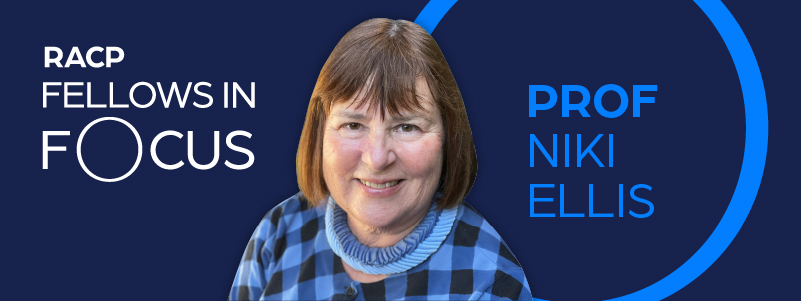RACP Fellows in Focus: Professor Niki Ellis
Date published:
04 Mar 2022

“It took me a while to find my tribe,” Professor Niki Ellis explained when we caught up with her to take a deep dive into a career that has meandered and weaved in and out of opportunities.
Niki graduated in Tasmania and went into the Royal Hobart Hospital, working there as a resident for two years. Soon after joining the basic physician training program she quickly identified her sense of deep unhappiness, “It just didn't really fit for me and I couldn't see that at the time.”
“However, I was so lucky and it was one of those serendipitous moments. A consultant I was working for in oncology, Dr Alan Foster, had been a minister for health and he could see I wasn't happy. He took me aside and he said, “I think you've got the kind of brain that would suit public health. What do you think about that?” After we spoke, he picked up the phone and rang the director of public health, stating, “I've got a young girlie down here. I'm sending her up, give her a job.” That's the way I got into public health and occupational medicine. And, as soon as I started it, I was, I knew I was in the right place.”
Niki enjoyed a decade working for the government, moving to the National Occupational Health and Safety Commission for the second half of the 80s. In 1990 Niki left the public service to set up her own strategic occupational and public health consultancy, before merging it with PricewaterhouseCoopers after 10 years. She left PwC to work in London on health innovation at London South Bank University and the Department of Health. Niki then returned to Australia to commence a decade in academia, developing new business models for collaborative research, aiming to improve research impact. She notes,
“My mind is naturally interested in management systems. I found the work with individuals a bit repetitive. I found myself being naturally attracted to systems, the groups of people that exist to make up systems and those that interact with systems on the outside. So once I got into that level of the health system, I was in clover!”
This broad range of experience has provided Niki with an extremely rich skillset, but her trajectory has not been without its challenges. Most notably when she was approached to take up a chair of the new Centre for Military and Veterans’ Health at the University of Queensland.
“I haven't come through the normal academic pathway,” she laughed. “I thought to myself, am I going to be accepted? I don't have a PhD, but I've written a textbook. Thankfully, the assessment panel thought the textbook was good enough, so they made the appointment. It was something where I just had to jump in at the deep end and hope it would be all right. That's something that women don't do enough. We worry if we have the competencies to do the job, whereas men tend not to worry about that so much. Sometimes you have to fake it till you make it!”
Niki’s path has been anything but conventional and she revels in that knowledge. She also believes that there are huge opportunities for occupational physicians to have a greater scope of work she said, “there’s so much more that we could be offering.”
“We should be in boardrooms talking about the relationship between health and work in a much broader way. In order for that to happen, individual occupational physicians need to be bolder. They need to look at their skill set. They need to think about how they could be contributing and not following the current template. They need to step out. For example, there's an occupational physician called Rob McCartney who, during the pandemic that we're in now, went to Woolworths and convinced them they needed a chief medical officer. They were convinced by what he had to say and made that appointment. That's what we need, more of that.”
Looking back on her career, Niki explained how she felt she’d, “made the most of the opportunities and said “yes” more frequently than “no.” I worked really hard to get everything done and that's paid off. In terms of a legacy, it's going to be in workplace mental health.”
“I would hope that my contribution would be seen as helping to change the way we think about workplace mental health. We have to continue to help people who have stress responses and mental health problems. But up until now we have neglected to address job design and the way people are managed are well. A lot of my work has looked at the way work is organised, the way people are led and how that has an impact on them, both positively and negatively. I liked to think that I made a difference in that area and that I recorded the difference both in my textbook, but also in a television series that I made for the ABC in 2008 called ‘Stressbuster’.
Niki currently works as a consultant to a variety of government, not for profit and private sector organisations and as a non-executive director.